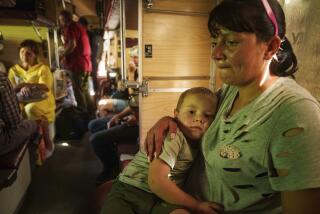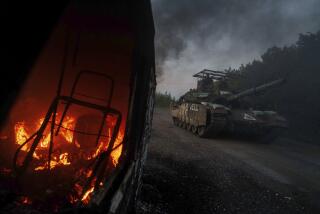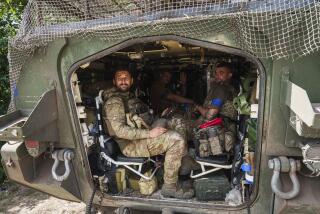U.N. Troops Held as Human Shield : Bosnia: Ukrainian peacekeepers in Zepa ‘safe area’ detained by Serbs to ward off NATO air strikes. Rebel advance slows as government soldiers strongly resist.
- Share via
SARAJEVO, Bosnia-Herzegovina — Bosnian Serbs attacking the Muslim “safe area” of Zepa detained Ukrainian U.N. peacekeepers Monday and threatened to kill them if NATO warplanes appear, effectively creating human shields against air strikes and giving the rebel Serbs the upper hand against an indecisive West.
Still, Bosnian government forces defending Zepa managed to hold off the onslaught by the better-armed Serbs, at least for the moment, as officials began urgent negotiations to evacuate many of the enclave’s 16,000 Muslims.
“It is true that Zepa is being attacked,” said Bosnian Prime Minister Haris Silajdzic, “but it is also true that our soldiers are defending very well--surprisingly well, considering what they have compared to the [Serbs].”
As Washington, London and Paris failed to agree on action in Bosnia-Herzegovina, worried humanitarian officials demanded access to 4,000 or so Muslim men and boys captured when Bosnian Serbs overran the safe area of Srebrenica last week. The rebel Serbs, who earlier said they would allow visits by the Red Cross, have not yet done so, in violation of international law.
Another large group from Srebrenica--several thousand soldiers and some civilian women and children--were reported to have made a dramatic escape from advancing Bosnian Serb troops and to have reached government-held territory.
The group, carrying its wounded through the forested hills above Srebrenica, trekked for miles under heavy Bosnian Serb attack to cross the rebel Serb lines, relief workers said, quoting government reports. Some soldiers reached the northern Bosnian city of Tuzla, where more than 23,000 refugees are crowded into makeshift shelters after the conquering Serbs expelled them from Srebrenica. They told reporters in Tuzla of having to battle Bosnian Serbs through most of their odyssey, and of leaving many dead behind.
The news of these arrivals helps authorities to begin to account for as many as 15,000 people thought missing after the fall of Srebrenica.
While the original Srebrenica population figure of 42,000 may have been inflated, it is also thought that many residents had fled before the Bosnian Serbs attacked, others may have melted into the woods and are in hiding, while thousands of soldiers are fighting their way to safety. An unknown number of people were killed.
“Whatever the figures, we still have thousands of people not accounted for . . . we still have thousands of people missing or held incommunicado,” said Kris Janowski, spokesman for the Office of the U.N. High Commissioner for Refugees.
The United Nations created six safe areas two years ago to offer protection to tens of thousands of Bosnian Muslims driven from their homes by Bosnian Serb campaigns of “ethnic cleansing.” Srebrenica, Zepa and Gorazde are the three eastern enclaves, always considered most vulnerable.
The inability of the United Nations to save Srebrenica and, probably, Zepa from being overrun by Bosnian Serbs has infuriated the Bosnian government, further disillusioned the Bosnian people and brought the nationalist Serbs closer to all-out victory in carving Bosnia into their own “Greater Serbia.”
“The U.N. mission in Bosnia-Herzegovina is at an end,” Foreign Minister Muhamed Sacirbey said Monday at a news conference in Washington. The mission “will either voluntarily withdraw, or at the latest by November we will look for [its presence] to be terminated.”
In an apparent effort to offer the people of Zepa some degree of safety, Bosnian President Alija Izetbegovic met with British Lt. Gen. Rupert Smith, the commander of U.N. forces in Bosnia, to discuss evacuating the wounded, elderly and sick, Bosnian television reported. Although evacuating Muslims from land the Bosnian Serbs want, in effect, plays into the rebel Serbs’ hands, Izetbegovic may feel it necessary to spare Zepa’s weakest from the kinds of atrocities reported by the refugees who fled Srebrenica.
A spokesman for Bosnian Serb leader Radovan Karadzic on Monday denied that Bosnian Serb soldiers committed the rapes, murders and other atrocities detailed by the refugees, blaming the reports on a Muslim disinformation campaign.
Backed by tanks and mortars, the Bosnian Serbs breached the edge of the Zepa enclave Sunday and moved to within a mile of the town of Zepa. They continued to launch artillery barrages Monday but failed to advance deeper into the pocket, U.N. officials said.
It was unclear why they had slowed their advance. But Zepa sits in a canyon; the forested mountain terrain is difficult to maneuver in, and the Bosnian Serbs apparently met a fair amount of unexpected resistance from government troops who, using weapons they stole from U.N. posts, established eight defensive mortar positions in a last-ditch fight, said U.N. spokesman Lt. Col. Gary Coward.
U.N. officials continue to believe that Zepa’s demise is only a matter of time.
On the eve of the Bosnian Serb attack on Zepa, desperate government soldiers seized U.N. weapons from four observation posts. The peacekeepers succeeded in disabling some of their best weapons before the soldiers took them.
By Monday, the harassed Ukrainians had abandoned six of their nine posts, which form a protective boundary around the enclave, and had retreated to their base camp.
Bosnian Serbs then surrounded Ukrainian Checkpoint Two and mined the access roads. Their commander warned that if planes from the North Atlantic Treaty Organization, which buzzed Zepa on Sunday, made a repeat appearance, the Bosnian Serbs would attack the post. It is on the southwest corner of the enclave where most of the fighting has been taking place.
More to Read
Sign up for Essential California
The most important California stories and recommendations in your inbox every morning.
You may occasionally receive promotional content from the Los Angeles Times.














